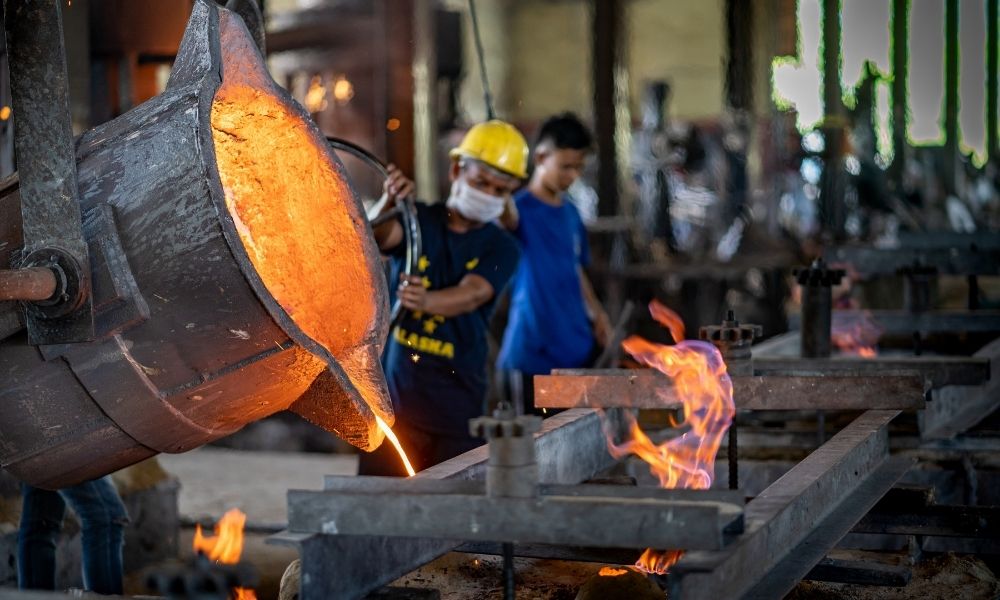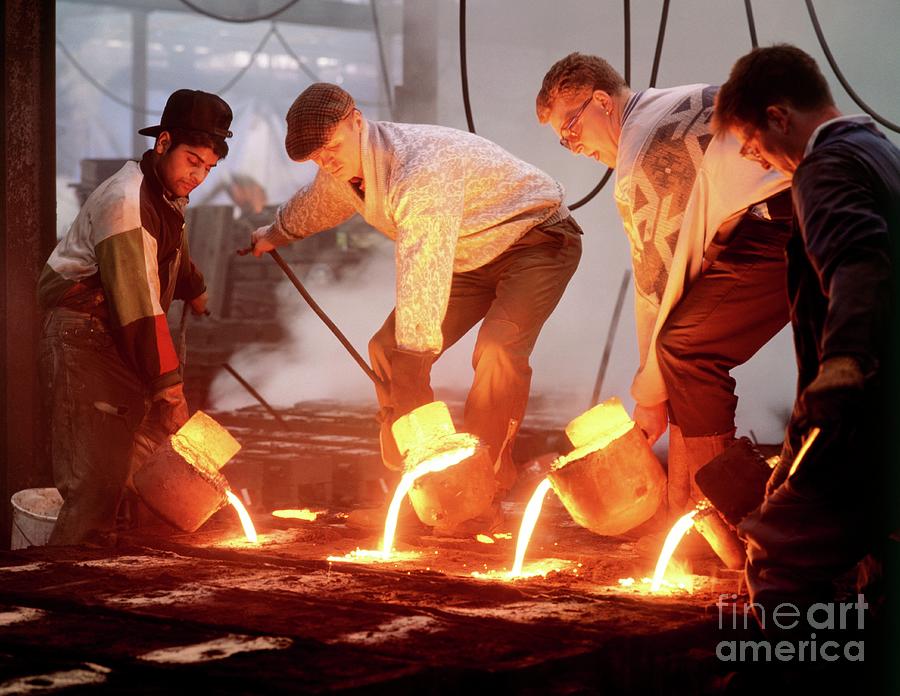Beginner’s Guide into How a Metal Foundry Manufactures Durable Metal Components
Wiki Article
A Comprehensive Guide to Metal Casting: Advantages and Services Used by Foundries
Metal casting is an essential process in various sectors, supplying countless advantages through the services of shops. These facilities change liquified metal right into durable and precise parts, satisfying certain customer needs. By using sophisticated innovations, shops assure high quality and efficiency in manufacturing. The complexities of metal casting and the varied methods included elevate important concerns regarding its function in modern-day production. What technologies lie in advance in this important area?Recognizing the Metal Casting Process
The metal casting process is a basic method used in making to create complex forms and components. This method entails putting molten metal into a mold and mildew created to form the desired things. The procedure starts with pattern creation, which works as a layout for the mold and mildew. Metal Casting. Different materials, such as sand, metal, or ceramic, are made use of for mold-making, depending on the certain requirements of the casting
As soon as the mold and mildew is ready, liquified metal is put into it and allowed to solidify and cool. After solidification, the mold and mildew is removed, exposing the actors component. Numerous techniques, including sand casting, financial investment casting, and die casting, are used, each fit to different applications and materials. Quality assurance actions, such as inspections and screening, are necessary to guarantee the final product meets requirements. In general, the metal casting procedure plays an important role in producing components for industries varying from automotive to aerospace.
Trick Perks of Metal Casting
Metal casting uses considerable benefits that make it a favored production technique in different industries. Its layout versatility and accuracy allow for complex shapes, while affordable automation boosts effectiveness. In addition, the convenience and stamina of materials made use of in casting add to the sturdiness of the final products.Style Flexibility and Accuracy
Launching remarkable style versatility and accuracy, metal casting enables designers and engineers to develop intricate shapes and functions that would be impossible or challenging to achieve with various other making methods. This ability allows the manufacturing of intricate geometries, interior structures, and fine information that improve product functionality and looks. Additionally, different casting strategies, such as sand casting, investment casting, and pass away casting, provide additional choices for personalization, fitting varied product residential properties and task needs. The adaptability of molds allows modifications during the style stage, streamlining the change from idea to last product. Inevitably, metal casting stands apart for its ability to provide high-precision elements, making it an invaluable procedure in sectors ranging from auto to aerospace and beyond.Economical Mass Manufacturing
Cost-effective automation stands as one of the key advantages of metal casting, making it possible for manufacturers to create big amounts of components at a lower price per unit. This efficiency emerges from the ability to create intricate molds that can be reused numerous times, considerably lowering setup and functional costs. Furthermore, metal casting procedures, such as sand casting and die casting, permit high throughput, making it possible to fulfill the demands of massive production runs. The reduced product waste and energy consumption even more improve expense savings, making metal casting an attractive option for sectors needing mass components. Generally, the economical nature of metal casting placements it as a favored approach for suppliers aiming for financial effectiveness in their manufacturing procedures.Material Versatility and Strength
Among the standout features of metal casting is its amazing product adaptability, which allows for making use of a large range of steels and alloys. This adaptability enables suppliers to select products that best fit their certain applications, from light weight aluminum and bronze to iron and steel. Each metal uses special residential or commercial properties, including varying levels of toughness, deterioration resistance, and thermal conductivity. Metal casting can produce elements that meet stringent performance demands across varied markets, such as vehicle, aerospace, and building and construction. Furthermore, the stamina of cast steels can be enhanced through numerous therapy processes, guaranteeing durability and longevity. Aluminum Foundry. On the whole, the combination of material flexibility and intrinsic strength makes metal casting a recommended choice for generating top notch componentsKinds of Metal Casting Techniques
Metal casting includes a selection of techniques that satisfy different production requirements and material residential or commercial properties. Common techniques include sand casting, which makes use of a sand mold and mildew for complex shapes, and financial investment casting, known for its precision and surface coating. Die casting is an additional strategy that utilizes high-pressure shot of molten metal right into molds, suitable for mass manufacturing of small parts.Covering molding offers a much faster different, making use of a resin-coated sand to produce thin-walled molds, while shed foam casting permits complex designs without the need for a core.
Additionally, continuous casting is utilized for creating long areas of metal, such as sheets or bars, by strengthening liquified metal in a constant process. Each technique presents one-of-a-kind advantages and is picked based upon aspects like the required detail, production quantity, and material kind, ensuring premium outcomes in metal construction throughout various sectors.
The Function of Foundries in Metal Casting
Foundries play a crucial duty in the metal casting procedure, working as the facilities where molten metal is changed into finished items. These specialized facilities are furnished with the essential tools and modern technologies to handle different metals, ensuring high-quality results. Shops are liable for numerous crucial features, including thawing the metal, pouring it into mold and mildews, and permitting it to strengthen.Additionally, they keep rigorous security and environmental standards to shield workers and decrease ecological influence. Experienced service technicians and designers work together to maximize casting processes, enhancing effectiveness and decreasing waste. Shops also participate in quality assurance measures, ensuring that the final items fulfill specific resistances and requirements. This quality control is important for sectors that rely upon specific parts, such as vehicle and aerospace. Consequently, factories contribute considerably to the general production landscape, making it possible for advancement and growth throughout numerous fields.
Custom-made Metal Casting Services
Personalized metal casting solutions provide customized style services that satisfy particular customer needs. These services additionally supply material selection experience, making certain the right metal is chosen for the preferred application. Such adaptability and understanding boost the general quality and efficiency of the end product.
Tailored Style Solutions
Tailored style remedies in metal casting supply suppliers with the versatility to develop parts that meet details efficiency and aesthetic needs. Factories provide customized services that enable clients to define dimensions, shapes, and surface coatings to attain desired outcomes. This customization procedure commonly consists of partnership between designers and designers, guaranteeing that the final items align with operational demands and sector requirements. Advanced innovations, such as computer-aided design (CAD) and simulation software application, allow accurate modeling and screening of elements prior to production, reducing mistakes and improving efficiency. By leveraging tailored design options, companies can optimize performance while decreasing waste and costs, eventually bring about a much more competitive edge on the market. This versatility is important for markets calling for distinct applications and specs.Product Option Know-how
When choosing materials for metal casting, expertise plays a necessary role in making sure that the best selection straightens with both efficiency demands and cost-effectiveness. Shops use competent specialists who understand the homes of numerous steels and alloys, enabling them to suggest perfect products for details applications. Variables such as stamina, deterioration resistance, and thermal conductivity are meticulously thought about to satisfy the customer's demands. In addition, market trends and improvements in material scientific research inform these choices, making it possible for foundries to remain competitive. By leveraging their expertise, factories can help customers in guiding through complex product options, inevitably bring about enhanced item top quality and lowered production costs. This specialized understanding Get the facts is vital for achieving successful outcomes in custom-made metal casting solutions.Top Quality Control in Metal Casting
Quality control in metal casting is critical to ensure that the end products meet the needed requirements and performance standards. Foundries utilize a variety of strategies and techniques to assure the finest of actors components. This process begins with stringent product assessments, validating that resources abide by market criteria. Throughout the casting procedure, real-time tracking and testing are carried out to assess parameters such as temperature level, mold integrity, and dimensional accuracy.
Applications of Metal Castings Across Industries
Metal castings play an essential role in different sectors, serving as the foundation for numerous applications. In the vehicle industry, cast components such as engine blocks and transmission housings are required for automobile performance and integrity. The aerospace industry relies upon accuracy castings for vital parts that assure safety and efficiency in flight. Additionally, the building market makes use of metal spreadings for components, installations, and architectural elements, boosting the sturdiness of buildings and framework.Additionally, the energy industry gain from castings used in generator blades and various other equipment crucial for power generation - Aluminum Foundry. The medical field also makes use of metal spreadings in gadgets and tools, showing the flexibility of this manufacturing process. Generally, metal spreadings are essential to the functionality and advancement of diverse fields, showcasing their value in modern technology and infrastructure growth
Often Asked Inquiries
What Materials Are Generally Utilized in Metal Casting?
Usual materials used in metal casting include light weight aluminum, iron, steel, bronze, and brass. Each product uses distinct homes suitable for different applications, enabling suppliers to pick the very best option based on rust, weight, and toughness resistance.The length of time Does the Metal Casting Refine Commonly Take?
The metal casting procedure normally takes numerous hours to a few days, relying on elements such as the intricacy of the design, type of metal used, and the certain casting technique employed by the shop.
What Is the Ecological Influence of Metal Casting?
The ecological impact of metal casting consists of power usage, emissions, and waste generation. Foundries often apply actions to reduce these effects, such as reusing materials and utilizing cleaner technologies to minimize their environmental impact.Can Metal Casting Be Provided For Small-Scale Projects?
Metal casting can without a doubt be executed for small-scale projects. Various foundries accommodate such needs, offering customized solutions that accommodate minimal manufacturing runs while maintaining high quality and accuracy in the end products.What Are the Precaution in Metal Casting Foundries?
In metal casting foundries, precaution consist of personal protective devices, appropriate ventilation, training on tools usage, emergency situation procedures, normal upkeep checks, and adherence to sector safety and security criteria to minimize risks associated with liquified metal and harmful materials.Additionally, metal casting processes, such as sand casting and pass away casting, permit for high throughput, making it viable to meet the demands of large manufacturing runs. One of the standout features of metal casting is its impressive product adaptability, which enables for the use of a vast array of alloys and metals. In addition, constant casting is used for producing lengthy sections of metal, such as bars or sheets, by strengthening see this page liquified metal in a continuous procedure. Factories play an essential role in the metal casting procedure, offering as the facilities where liquified metal is changed into ended up items. Typical products utilized in metal casting consist of light weight aluminum, iron, bronze, brass, and steel.
Report this wiki page